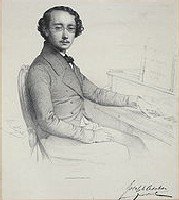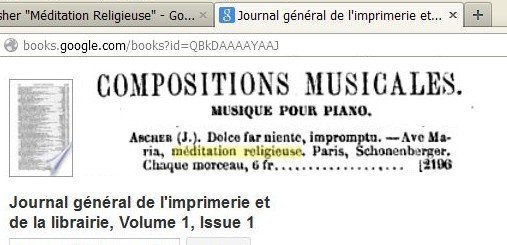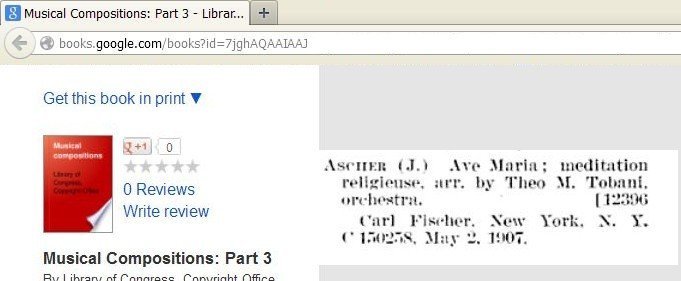Asher, Joseph - Ave Maria - Méditation Religieuse Op.66
 for piano
for piano
year of composition / 1st publication: 1857
 |
Composer:
Joseph Ascher (1829-1869) aliases, aka: Country of origin / activity: The Netherlands / U.K. / France |
|
| Text author: none - instrumental | ||
| Arranger / Editor: 1907 arr. for orchestra by Theo M. Tobani |
Available documentation:
Score:| not available |
|
| Journal général de l'imprimerie et de la librairie , Volume 1, Issue 1 (Google eBook) Cercle de l'imprimerie, de la librairie et de la papeterie, 1857 - France  |
|
USA copyright catalog 1907  |
|
| My thanks and appreciation to ... for sending me this score. |
|
Lyrics: (source)
| not available |
| MIDI: not available | MP3: not available |
Recording:
| not available |
Video - posted on YouTube:
| not available at this time | YOU could be featured here! If you or your choir perform this Ave Maria, make a video recording. Post your video on YouTube, email me the page URL and I'll embed the video in this page. |
Internet references, biography information:
| A biographical dictionary of musicians (ed. Theodore Baker) G. Schirmer, 1905 - Biography & Autobiography - 695 pages |
b Groningen Holland June 4 1829 d London June 4 1869 [these dates are correct.] Pianist and composer pupil of Moscheles in London and Leipzig 1846 Went to Paris in 1849 and subsequently became court pianist to the Empress Eugenie Composed much popular salon music (over 100 nocturnes mazurkas galops etudes transcriptions) Favorites are the 2 mazurkas La Perle du Nord and Dozia and an etude Les gouttes d'eau besides the song Alice where art thou |
http://en.wikipedia.org/wiki/Joseph_Ascher |
| Joseph Ascher (4 June 1829 – 4 June 1869) was a Dutch-Jewish composer and pianist. He was born in Groningen, the son of the chazzan of the city, who went on to become a cantor in London. Ascher started his music studies in London. He continued his studies at the Music Academy of Leipzig, with Ignaz Moscheles as his teacher. His gift as performing piano player was recognized by the Empress Eugénie of France, who asked him to become her court pianist in 1849. Later on, he moved to London. There he died as the result of his dissolute life on June 4, 1869. He composed for piano, piano four- and eight hands, as well as for solo singers accompanied by piano. Some 200 of his compositions remain. |
Page last modified: August 17, 2013
 avemariasongs
avemariasongs org
org